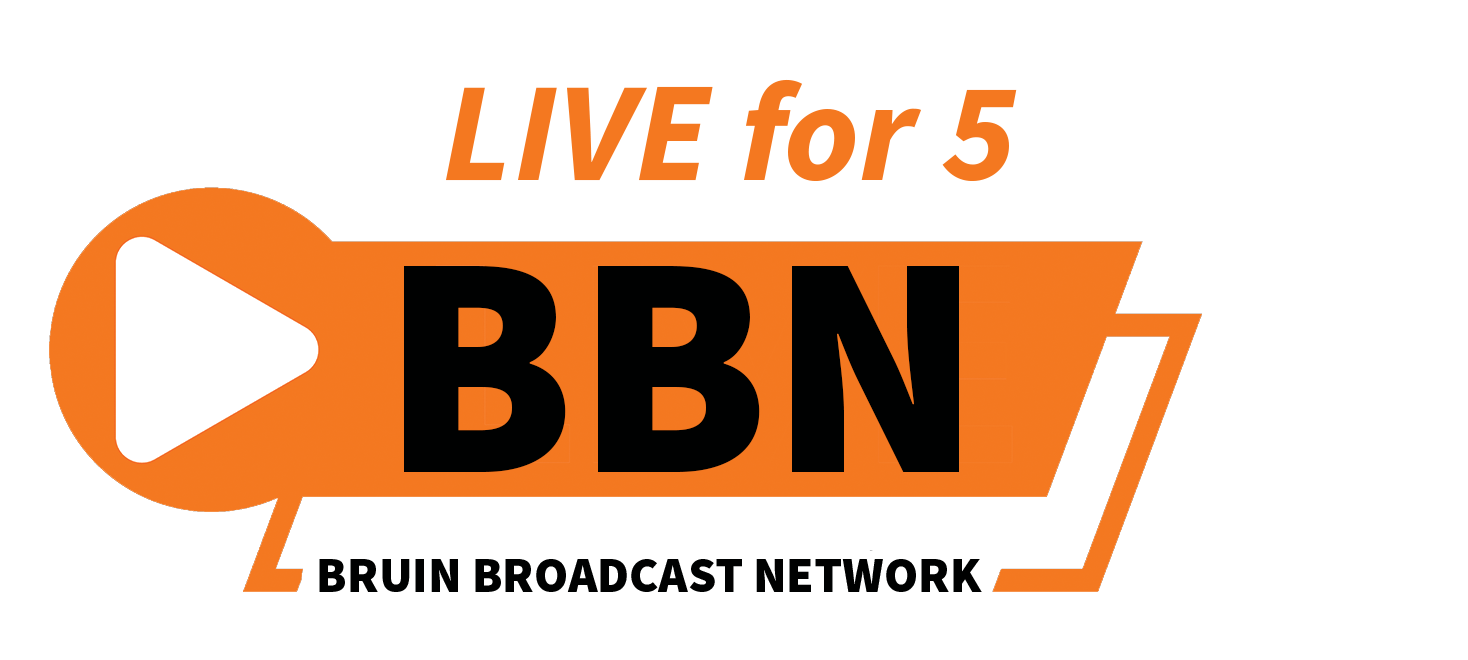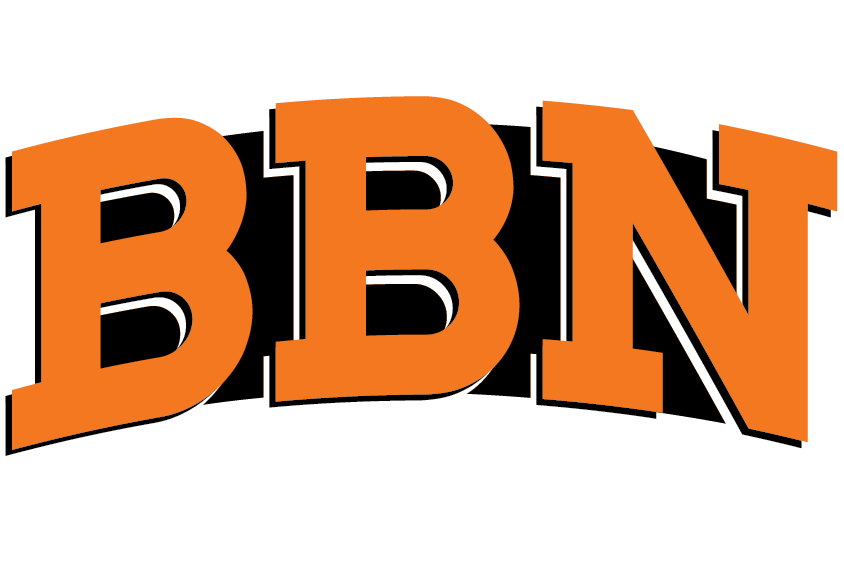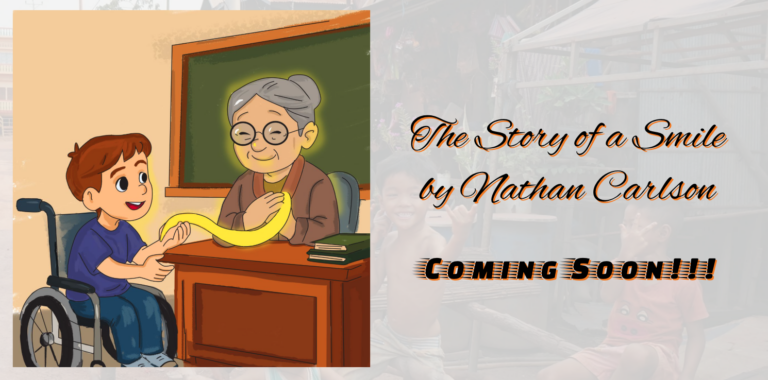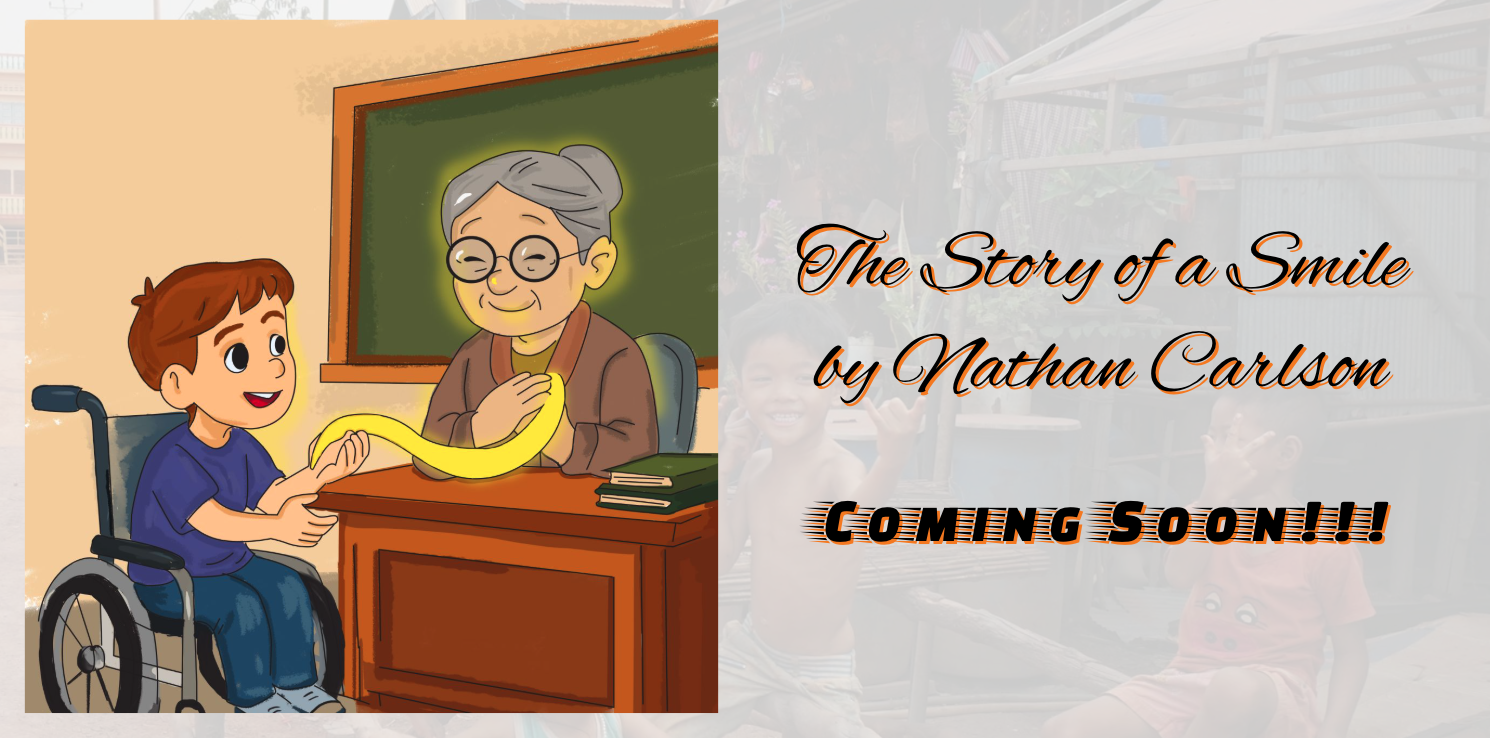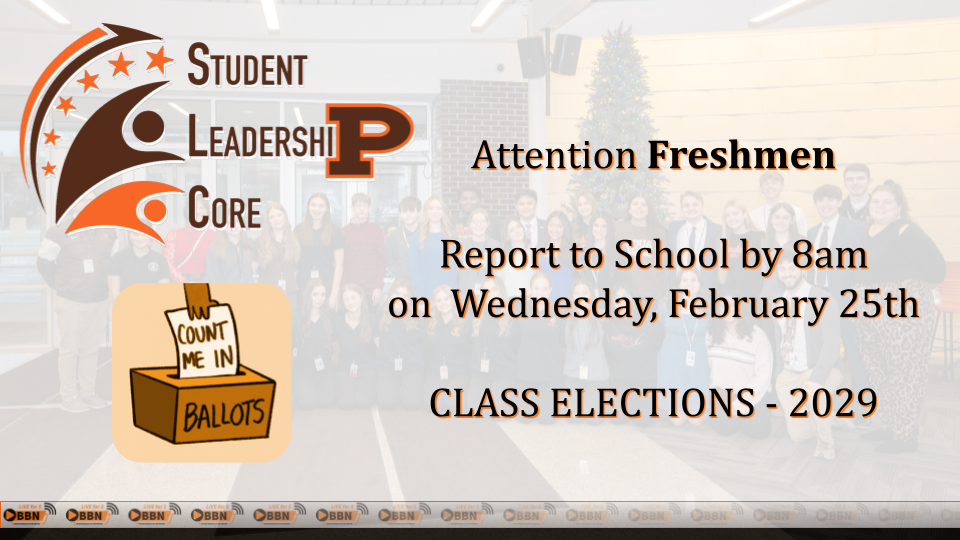An Interview with Amelie and Pauline – two of our German Guests
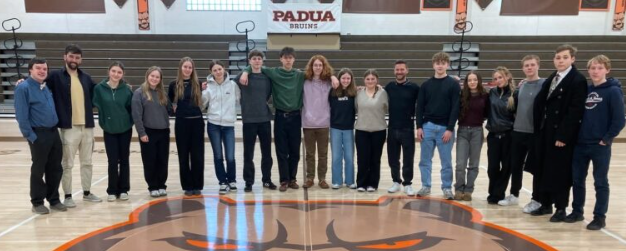
BY: CC THOMAS
At the end of March, exchange students from Ursulaschule, Padua’s Franciscan sister school in Osnabrück, Germany, traveled to the U.S. and stayed with Bruin host families. After their arrival on St. Patrick’s Day, the fifteen German students spent the following week shadowing their hosts in classes, sightseeing around Cleveland, and immersing themselves in American culture. They traveled to museums and sporting events to not only learn about life in America, but to truly experience it for themselves.
“I understand that not everyone has the accommodations that are right, but I really implore people with the proper housing to really consider hosting. I have seen many great friendships come from this exchange program, even to the point where people have moved to Germany.“
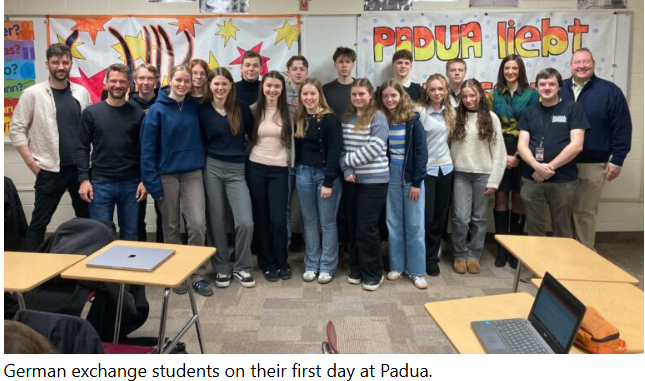
Although their visit was short, the German students and the two teachers that accompanied them formed lasting memories of America and strong bonds of friendship with their hosts before their departure on March 26th. Being an exchange student in a foreign land is truly a unique experience, so to gain some insight into what it’s like, BBN reporter CC Thomas interviewed Amelie and Pauline, two eleventh-grade visitors from Ursulaschule, along with their American host, senior Isabel Svec. Isabel, who happens to be the president of Padua’s German Klub, which means she had the responsibility of planning the after school activities the Germans took part in, even jumped in with a few questions of her own. But first, Isabel was interviewed separately to provide the BBN some information about the exchange program from the point-of-view of a host. Her interview went as follows:
“I think the teachers and the students have a better connection between each other, and our school is more strict I would say.“
CC: Did you enjoy hosting German students? Would you do it again? Are you going to keep in touch with your exchange student?
Isabel (IS): I love getting to host Germans from our sister school, this is actually the third year that I have hosted a German student. Unfortunately as a senior I will be unable to host next year but I loved every year that I hosted. Usually it is a bit harder to stay in perfect touch with the German students, it’s unlike someone you will call everyday, but I try to text the Germans I have hosted this year and previous years as often as I can. Usually students who have hosted before will get more texts from previous German students as it gets closer to the time the new group of German students come over. Also in the past the American and German students would send Christmas gifts or postcards. Usually most communication is through WhatsApp or social media.
CC: Would you encourage other Bruins to host exchange students in the future? If yes, how would you persuade them?
IS: I would wholeheartedly recommend hosting for any Padua student if they are able to. I understand that not everyone has the accommodations that are right, but I really implore people with the proper housing to really consider hosting. I have seen many great friendships come from this exchange program, even to the point where people have moved to Germany. If you are interested in meeting new people or just looking for a new experience, hosting is one of the best ways to do so. The German students are eager to learn about American culture and share German culture. Also they are all the same age as the American students here, so instead of reading an article about the top ten German cultural things, students who often host learn about slang, social media in germany, new foods, fashion trends, sports, and other things are usually more interesting than geopolitics. Also it is usually an active but really fun week for both the exchange students and American students, the German Klub comes up with after school activities that anyone hosting is invited to. This year we went to Top Golf, bowling, the Cleveland Metroparks Zoo, the mall, played laser tag, saw Snow White in theatres, and more. It is a time where you get to share and experience American culture with someone who is incredibly eager to learn. Hosting is an amazing experience and an incredible way to learn to communicate and be friends with people who have grown up in a completely different world, which is a life skill everyone will have to learn eventually.
CC: Have you considered traveling to Germany as an American exchange student? Do you think you would be able to communicate in German as effectively as the German students were able to communicate in English?
IS: I have actually already been to Germany as an exchange student. It was the summer of 2023, right between my Sophomore and Junior year. It was an incredible experience, the group started in Frankfurt and then had a week-long bus tour that followed the Brothers Grimm and different fairy tales. We were hosted by many of the Germans who had come in the Spring following the trip and enjoyed Osnabrück for a week. I was definitely able to communicate in some ways but it is completely different from the level the German Students are at. I had only been speaking German for two years, they had been speaking English since they were eight. Even now I wouldn’t be able to speak nearly as much German as they can speak English, but in Germany they are very nice and will make sure to really listen or speak slowly. It was very kind of them. Overall most of the people that the American group hung out with were able to speak fluent English but there were times where we had to speak only in German.
When will the next group of German students be coming to America?
Next year! This is a yearly exchange between Padua and Ursulaschule. There is a completely different group of students every year but they are still eager to come to America and learn about the culture here. If you were interested in hosting and were unable to for some reason, you have a whole year to plan if you really want to.
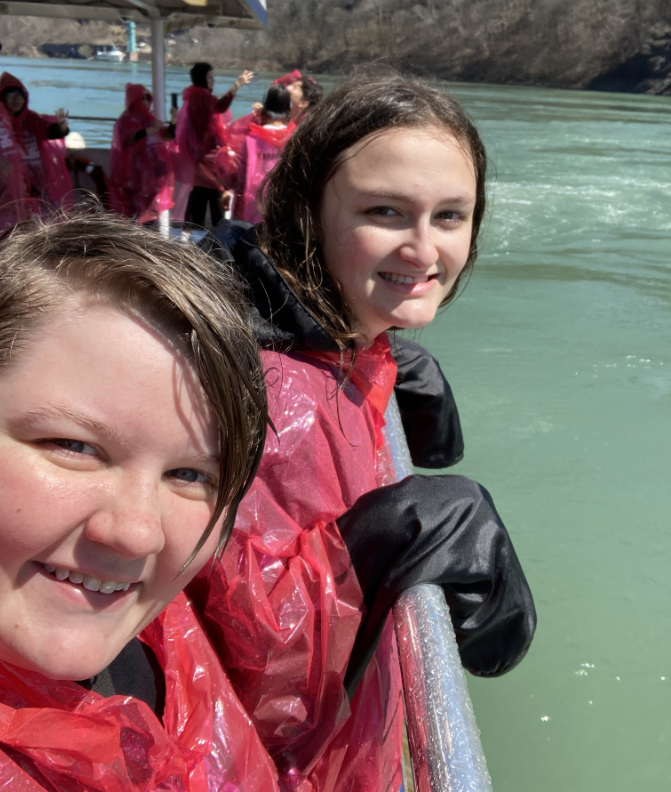
How are the after school activities chosen by the German Klub?
The after school activities are made up by the German Klub leaders. This year, as President, I mostly made the schedule and then the rest of the German Klub discussed what to change, add, or cut. Often the activities are chosen from years past enjoyment. If the current German Klub officials remember something going over really well, they add it to the schedule, and activities that flopped are cut. After the schedule is made it is given to the hosting families and they are able to tell us what they can or cannot make it to. We try to have the most accommodating schedule for the most amount of people as possible.
Below are some excerpts from the interview with Isabel and two exchange students, Pauline and Amelie:
CC: What has been your favorite part of your visit?
Pauline (P): Everybody asks us that, but we don’t have a favorite part because everything was very good, and the families are so kind and so nice.
Amelie (A): That’s true. In general, all the people here are very kind. That was also kind of surprising, because it’s different in Germany.
P: It was very beautiful in general.
CC: Are people not as hospitable or welcoming in Germany?
A: It depends where you are. If you’re just somewhere in the middle of the city they are just like, “Why are you standing in my way?” But if you’re more in the landscape then the people are getting nicer.
CC: What has been the biggest difference between Germany and the USA and what’s the biggest adjustment you’ve had to make?
A: Like we said with the people, that they’re so kind here, but also—
P: —the education is different from our school.
A: That’s true. I would say that here it’s much easier than in Germany.
P: I think the teachers and the students have a better connection between each other, and our school is more strict I would say.
A: Yeah, not in every way, but I don’t know, like, the lessons are more quiet.
P: I think it’s more relaxed here.
CC: What is something that’s widely available in Germany, but you haven’t been able to find it here or you haven’t heard of anyone having it in America?
IS: Gutes brot. (translation: good bread)
A: Haha, true. The bread culture here is very small, but in Germany it’s very big, and you can get a lot of different types of breads.
IS: You gotta try some German bread, it’s amazing.
CC: What about in America? What’s something we have here that you just don’t really have in Germany?
A: Oh, for example, Target or Walmart. Like the real big supermarkets and everything. We don’t have this. We have a lot of separated supermarkets.
P: We have grocery stores, and some stores for beauty.
A: And for clothes, so it’s all separate.
P: Small stores, yeah.
CC: Is it confusing to be here, where pretty much nobody is speaking your first language?
A: No, not really because we study English since third grade, so I was just kind of used to it. And also from the media and everything and watching movies. I’m always doing it in English.

IS: Could you describe the process of how you got picked to come to the U.S.? How were you guys able to choose to come here?
A: We had to write an application letter about why we wanted to go here and also about some of our own interests. Then some teachers picked some students.
P: And then there was a big part where the teachers grabbed the names.
IS: Like pulling random names from a hat, like a random drawing?
A: Yes, like that.
CC: That’s interesting. I just assumed there wasn’t that much interest, so they sent everyone who wanted to go. Were there a lot of people who didn’t get to go?
A: I think it was like five people, or six. I think there were twenty-one who wanted to go and fifteen who could go.
P: In the last few years the interest was bigger, I think.
A: Yeah, much bigger, so they also had to come to an interview and everything.
P: There was a big drama.
IS: And now the BBN will get into the German drama!
*Everyone laughing*
CC: What have you guys been up to on your visit? Have you gone anywhere, seen anything?
P: We went to see Niagara Falls. It was very cool.
A: Before we came to Ohio we were in Washington D.C. for three days.
P: We’ve been to lots of museums.
A: Like the Rock & Roll Hall of Fame.
P: And the art museum.
A: We did play laser tag and we went bowling. We saw a lot of things, I would say. We walked around in some Metroparks. We went to the movie theater in the mall and watched Snow White.
P: The movie theater is very different from ours.
A: Yeah, like you could lay down. You could pull out the recliner. That was pretty cool.
CC: I know you mentioned you went to laser tag. Do you have laser tag in Germany?
P: Yes, we have it in an arena, too.
A: It’s pretty cool, I think we can play it everywhere. Doesn’t matter where, it’s always fun.
IS: What are some things that you guys are going to take away from this trip and from getting to learn about American culture? Big question, I know.
P: Maybe more language skills.
A: Yeah, I think I did learn some words that I haven’t heard before or that I missed, so now I can use them for a long time. For example, election. I didn’t know this word before. I always thought it was to vote, like, “to vote for something,” but it’s called an election. Or sleet. Snow and rain is sleet.
CC: That is kind of a weird word.
A: Yeah, it is. But I think that’s something I will take home. Also just this great experience and new friends.
P: Yes, it was very nice.
IS: Do you guys think you will ever want to come back to America?
P: Definitely.
A: Absolutely. Maybe not exactly in this part, but I want to go to California and travel around there.
CC: I’ve always heard that Europeans are shocked when they come to America because our country is so big. Like, I haven’t been to most of the fifty states and I’ve lived here my whole life. It’s just so big, there is so much to do. So maybe you’d want to go to California, like you said, or somewhere warmer.
A: Yes, somewhere that’s not so similar to Germany because the climate here is very similar to Germany.
P: It’s warmer over there right now than it is here.
A: True, it was cold there the whole time before we left and then just as we are leaving to go to colder weather in America, we got warm weather in Germany.
P: Our friends were sending us pictures in t-shirts and shorts.
IS: At least you had two days of nice weather here.
P: That’s true, but the other days were very cold.
CC: Weather definitely varies here.
IS: Yeah, when it started getting cold again, I think we told them “Ah, finally back to Ohio weather.” Haha.
CC: Do you guys have any comments about your experiences here before you go?
A: Just thank you that we could stay here. It was a very nice experience.
P: Yes, thank you.
CC: We’re so grateful to have you guys here. It was so fun to have you in our classes.
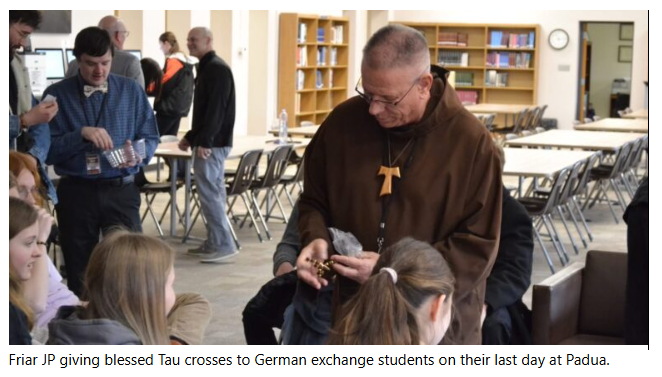
Heartfelt goodbyes (or “tschüss” in German) and promises to keep in touch were made the next day as the German students prepared to return home. Subsequent to this interview, on the last day of their visit, the Germans shared a catered meal with President Dave Stec ‘86 and Principal Bob DiRocco. They received custom pins from Padua’s art students. Friar JP gave them blessed Tau crosses to take home with them as a reminder that they are never alone, for they are always Bruins.
